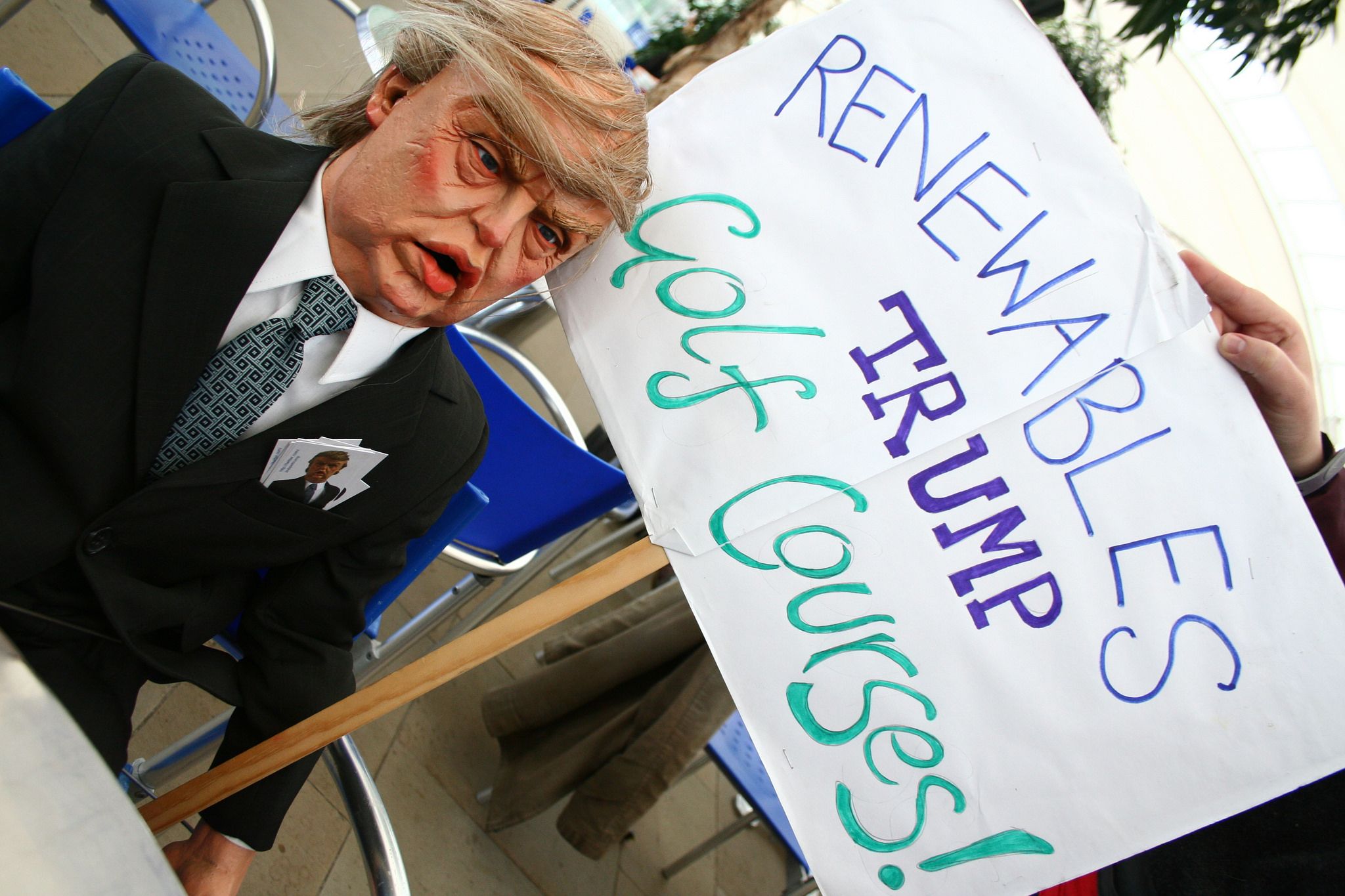While the UN climate change conference in Marrakesh just closed its doors, US president-elect Donald Trump is about to open the doors to his new work place – the Oval Office – in January. This is certainly bad news for those that fought hard to achieve the landmark that is the Paris Agreement, adopted last December and entered into force on 4 November this year.
Trump has always taken a rather unfavourable view on reducing CO2 emissions – to say the least. Already in 2012, he claimed that ‘[t]he concept of global warming was created by and for the Chinese in order to make U.S. manufacturing non-competitive.’ Investing in renewables also doesn’t seem to be a viable option for Trump who at a later time said that ‘[w]indmills are the greatest threat in the US to both bald and golden eagles’ while ‘[m]edia claims fictional ‘‘global warming’’ is worse.’ Trump does not stand alone with his views. Similar thinking can be observed with populists across the board. Geert Wilders, leader of the Dutch right-wing Freedom Party (PVV) brought into play that there may be only a ‘limited connection between CO2 emissions and climate change.’ This is also reflected in the PVV’s agenda 2010-2015 which explicitly states that ‘the climate changes, of course, as it always does’ and that ’man cannot increase or decrease temperature on earth by a few degrees.’ This ignorance regarding human-induced climate change also leads them to believe that funds should be diverted from climate protection or – to put it in the words of the PVV – ‘climate hysteria’. A similar stance is taken by the populist Alternative for Germany (AfD) which equally declares human-induced climate change to be non-existent and opposes Germany’s Renewable Energy Act, introduced in 2000 and renewed in 2014.
Populists such as Trump and Wilders not only try to undermine the scientific consensus that climate change is a reality and can largely be attributed to anthropogenic factors; they also try to delegitimise their political opponents. Far-right MEP and former leader of the French National Front (FN), Jean-Marie Le Pen once opened a watermelon to show how green activists were supposedly red communists underneath. As much as actions like these may seem worth a good chuckle because of their ridiculousness, we should be aware of the danger that stems from these attitudes.
Populists might jeopardise the progress that has been made in climate protection
With populists gaining ground not only in the United States but also in Europe and elsewhere, the achievements of climate activists and the promises of the Paris Agreement are put at risk. Donald Trump could withdraw the US from the agreement, which in May he announced he intended. Nevertheless, this could take up to four years. If Trump were to also withdraw from the 1992 climate convention that is underlying the Paris Agreement, the US could cancel the Paris Agreement within only one year after giving notice to the UN. In an attempt to backpedal, Trump recently announced in an interview with the New York Times that he had ‘an open mind’ about the Paris Agreement. Nevertheless, it is doubtful whether those words mean a lot, considering that he appointed Myron Ebell, a central figure in climate change denial, to run his transition team. The most likely option is that Trump will simply choose to ignore the US commitment to reduce greenhouse gas emissions under the agreement or at least not take it very seriously. This would significantly undermine efforts to curb greenhouse gas emissions since the US is responsible for 14.4% of global emissions, only surpassed by China with a share of 25.36%, according to the World Resources Institute.
The Brexit referendum and US presidential election both illustrate in a painful way that one can no longer rule out the possibility that populists may also win future elections. Consequently, the increased popularity of populist parties across Europe might actually have real policy implications. No one can predict with certainty what happens if FN leader Marine Le Pen makes it through the first round of France’s double-ballot system that is used in the presidential elections; and some 40 polls in the past two years have seen her coming through. Her father, Jean-Marie, managed to do so in 2002 to the great horror of most French but lost in the second round to Jacques Chirac by a very wide margin. Nevertheless, things have changed since then and France has moved significantly to the right. The FN does not make a secret of their disapproval of the Paris Agreement. FN MEP Mireille d’Ornano called the agreement a ‘communist project’, adding that ‘[w]e don’t want a global agreement or global rule for the environment.’ It is not implausible to assume that Le Pen, similar to Donald Trump, would not honour the agreement in case she moved into the Élysée Palace. Even though the upcoming elections in France, the Netherlands and Germany might not necessarily shift the balance of power in such a way that populist politicians seize power, the climate change discourse is bound to suffer from an increased populist presence in those countries.
The problem of moral hazard
A possible consequence of the US not living up to its commitments regarding climate protection is moral hazard, which occurs when one party engages in risky activities while other parties bare the cost. If the US chooses to ignore the Paris Agreement, other countries might not be willing to bear the extra cost and therefore be less inclined to introduce CO2 reduction measures and invest in renewables themselves. This domino effect, exacerbated by more populists gaining influence and speaking up against climate protection, could undermine the entire agreement. One should not forget that one of the drivers that brought the US and China to adopt the Paris Agreement was the desire not to be seen as morally inferior compared to the respective other. Consequently, there is less pressure on China to honour its commitments if the US does not honour theirs either. However, there are some voices that say China could use the new status quo as an opportunity to gain moral high ground over the US by respecting the Paris Agreement and introducing an ambitious climate policy, thereby assuming a leadership role.
It remains to be seen how these different scenarios will play out. One thing that can already be said with certainty is that the increasing prominence of populism will surely not benefit climate ambitions. If anything, it will make the already strenuous fight against climate change even more difficult.
You can download the article in PDF here.
Henning Twickler (1991), originally from Northern Germany, lived in the Netherlands, Belgium and China. He holds degrees in European Studies and Public Policy from Maastricht University and the United Nations University. Having a keen interest in energy and climate policies, he is currently doing an internship at the Heinrich Böll Stiftung European Union. Henning is a guest author on this blog


